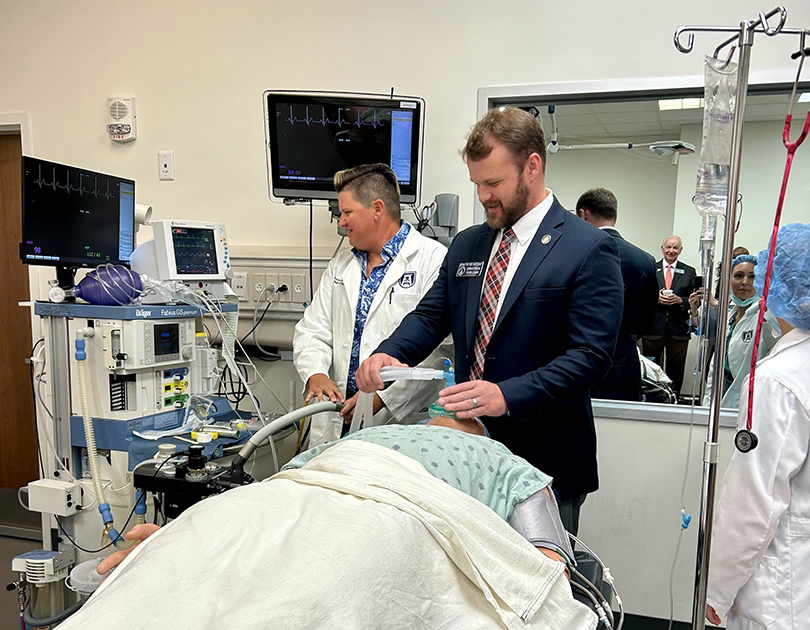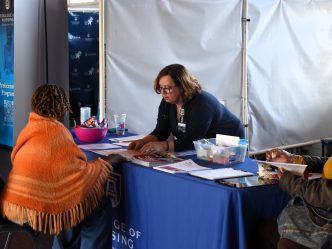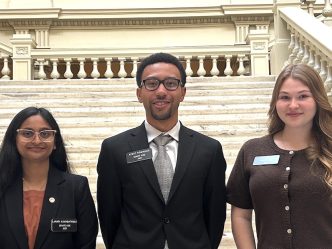Georgia senators recently toured Augusta University’s Interdisciplinary Simulation Center and held the second meeting of the Senate Study Committee on Rural Medical Personnel Recruitment.
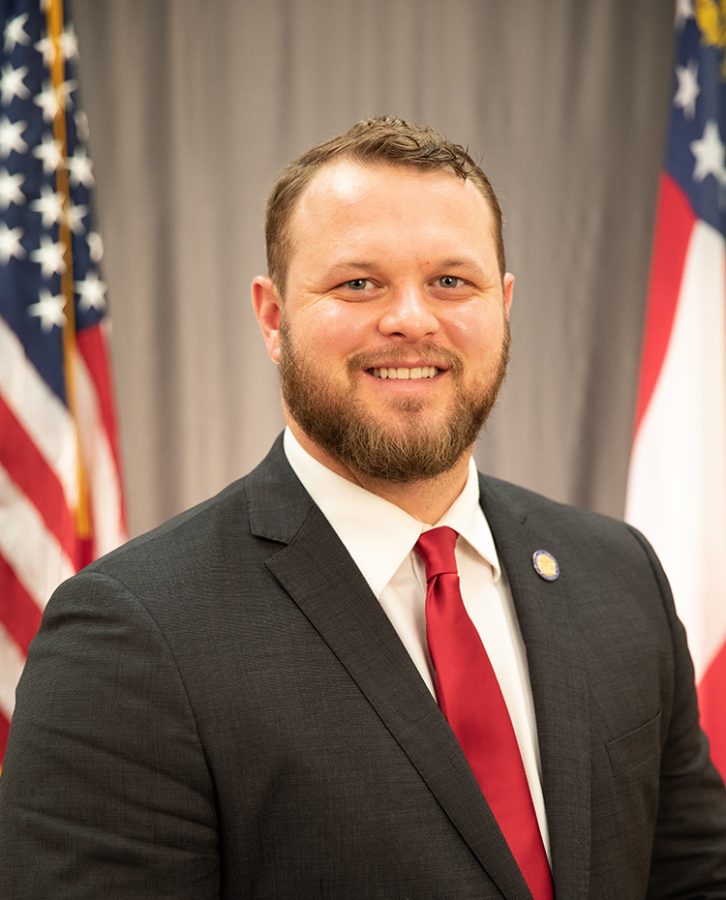
“Health care facilities across Georgia face numerous challenges when it comes to healthcare professional recruitment, especially in rural areas. A shortage of properly trained medical staff is dangerous for rural communities that are often hours away from large hospitals,” Sen. Bo Hatchett, R-Cornelia, who serves a rural area in northeast Georgia, said when he was named study committee chairman. “I appreciate Lt. Gov. Burt Jones for his diligence in creating this study committee and look forward to working with my Senate colleagues as we find creative solutions for the rural health care sector.”
The study committee, which was established through Senate Resolution 371 sponsored by Hatchett in the 2023 Georgia Legislative Session, is composed of Sen. Kim Jackson, D-Stone Mountain; Sen. Kay Kirkpatrick, R-Marietta; Sen. Nan Orrock, D-Atlanta; and Sen. Larry Walker III, R-Perry. It was enacted to gather public input and data to find solutions to the health care staffing shortages in rural Georgia.
The location of the hearing shows the critical role that Augusta University plays in providing education and training for medical staff across the state, particularly in rural communities.
“As Georgia’s health sciences university, with the only public medical school in our state, it’s important for state leaders and policy makers to understand what we are all doing here to help alleviate the shortage of health care professionals in the most underserved areas of Georgia,” said David Hess, MD, dean of the Medical College of Georgia at Augusta University. “Out of 159 counties in Georgia, 120 of them are considered rural. Our state also ranks 40th in the country in physicians per capita and that is certainly felt most acutely in these rural counties – some of them don’t have a single physician. I view it as MCG’s responsibility and a critical part of our mission to help alleviate these shortages.”
Beth NeSmith, PhD, interim dean of the College of Nursing, said it’s a joint effort as a university to tackle health care issues across Georgia.
“Augusta University not only contains the flagship public college of nursing in Georgia, but also hosts the Medical College of Georgia and the College of Allied Health Sciences. Events like these are important as Georgia’s health science university. We consistently maintain excellence as we transform the various health care professions, and we take our leadership role in being at the forefront of issues impacting health care very seriously,” said NeSmith. “Additionally, we are grateful to the Office of Government Relations for affording us the opportunity.”
“It was very eye-opening. The feedback I got from the senators that attended was they had no idea. And that’s exactly why the study committee was formed – to be able to say ‘this is how they’re trained; this is where the needs are; this is what it looks like in practice in these areas,’ in order for the study committee to come back and make a better informed decision about what is being asked of them.”
Shannon Broxton, DNP, associate professor and program and clinical director of the Nursing Anesthesia Program in the College of Nursing
To better understand how health care professionals work in rural areas, the study committee wanted to learn how certified registered nurse anesthetists specifically are trained in Georgia and how they and other health care professionals can be utilized across the state as a possible solution for the rural medical personnel shortage the state is experiencing.
“Georgia legislators participated in hands-on simulation and lab experiences while hearing of the in-depth training the Nursing Anesthesia Program provides to future CRNAs,” said Shannon Broxton, DNP, associate professor and program and clinical director of the Nursing Anesthesia Program in the College of Nursing. “Augusta University is home of the longest-running and only state-funded CRNA program in Georgia.”
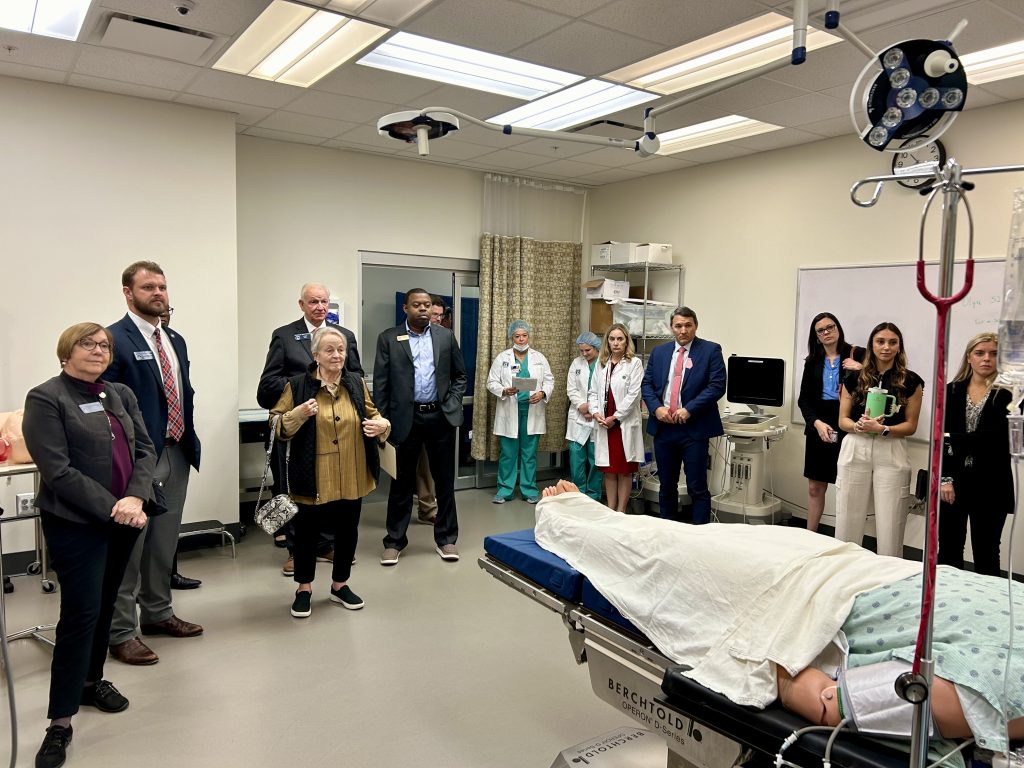
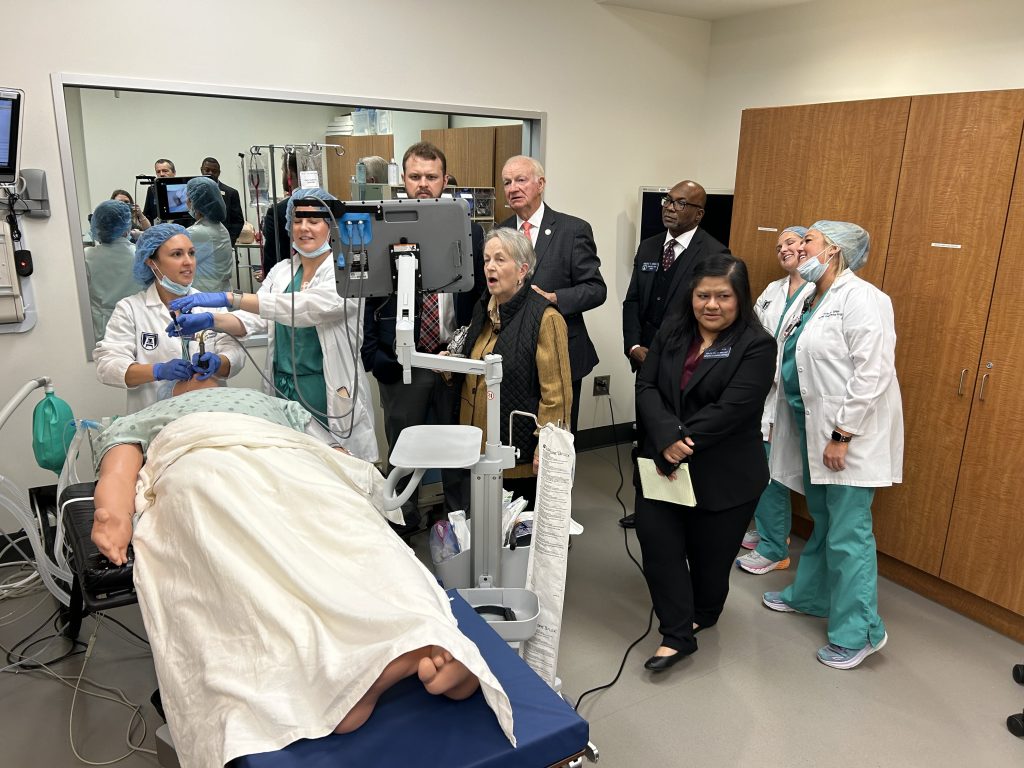
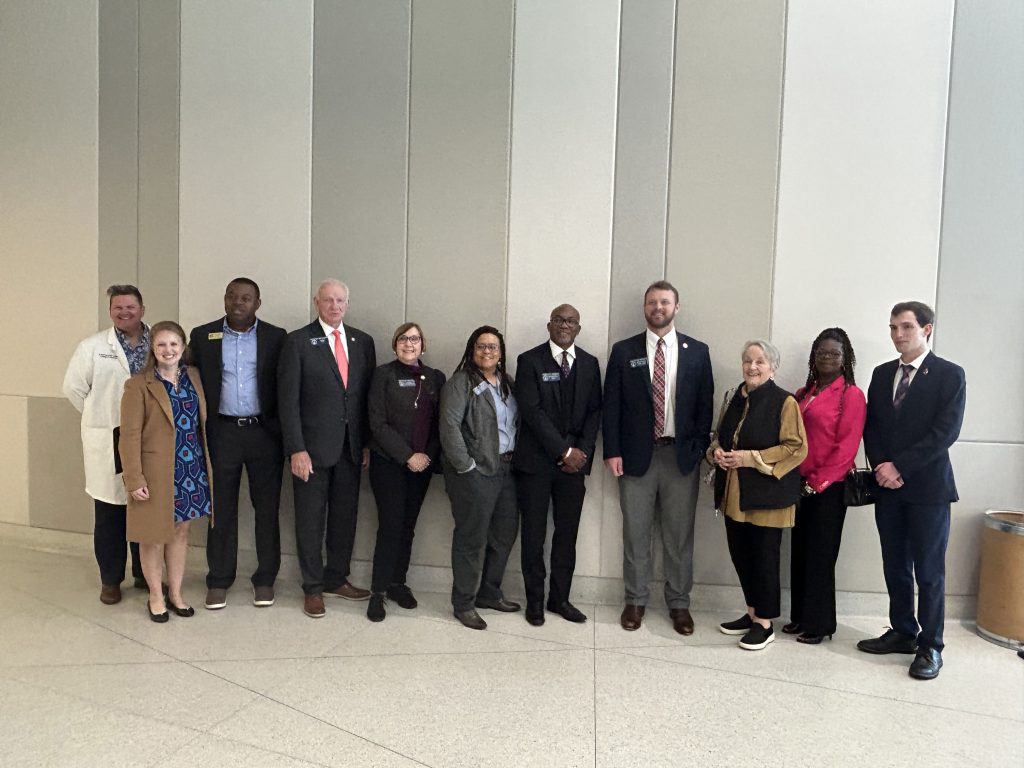
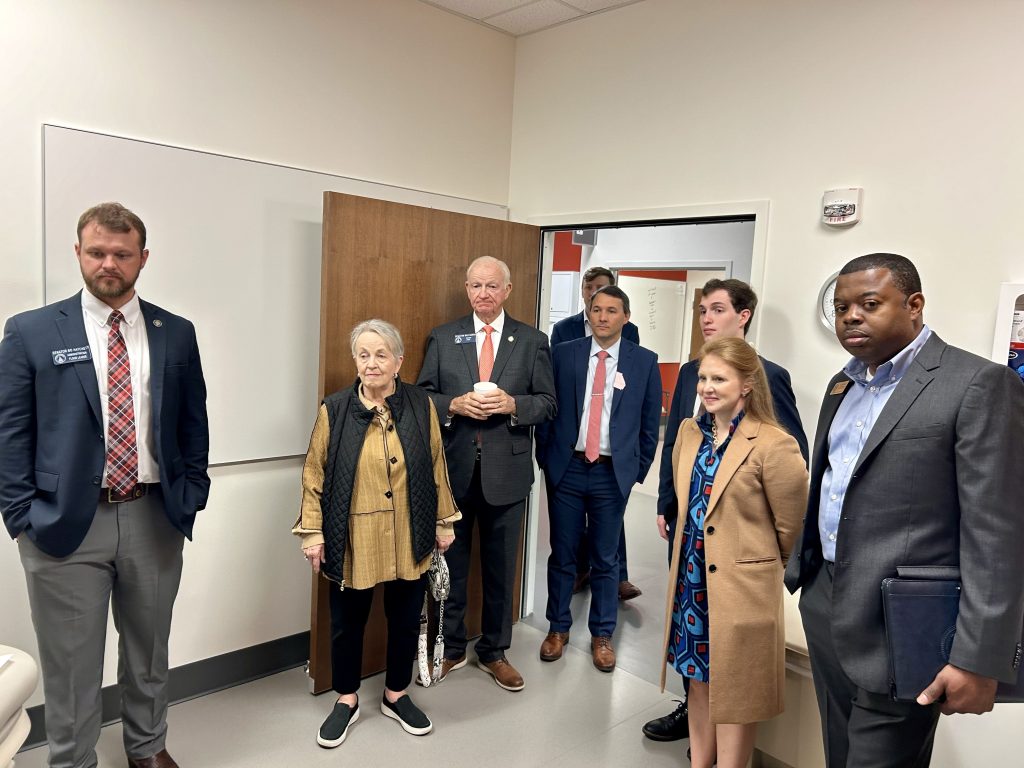
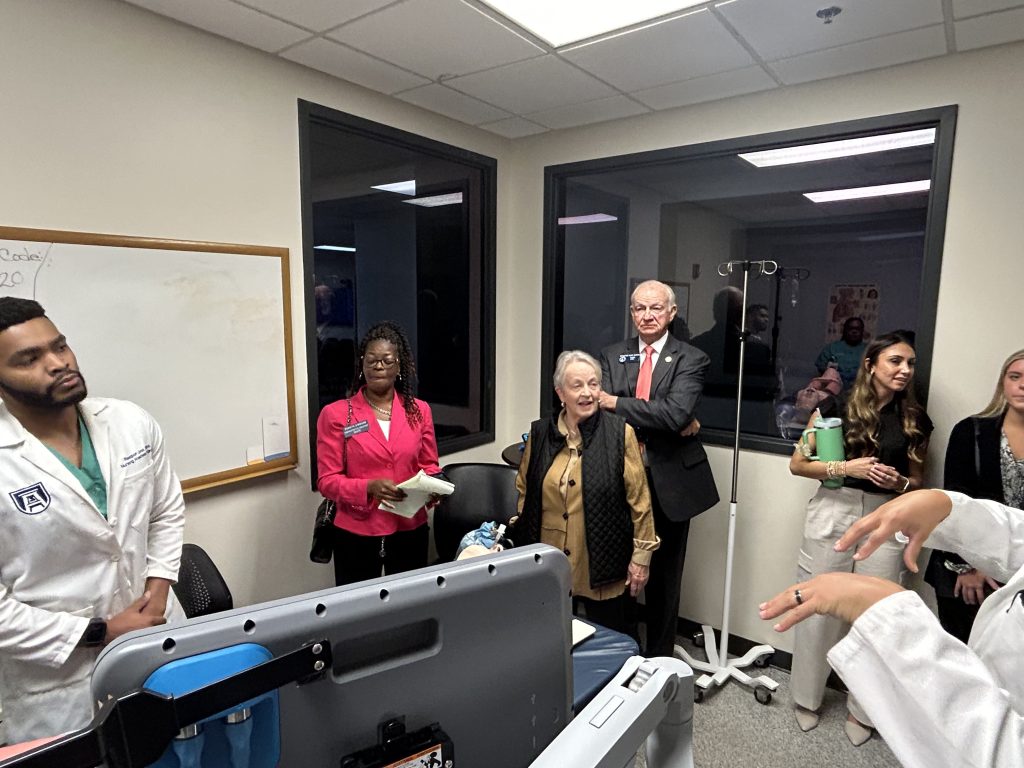
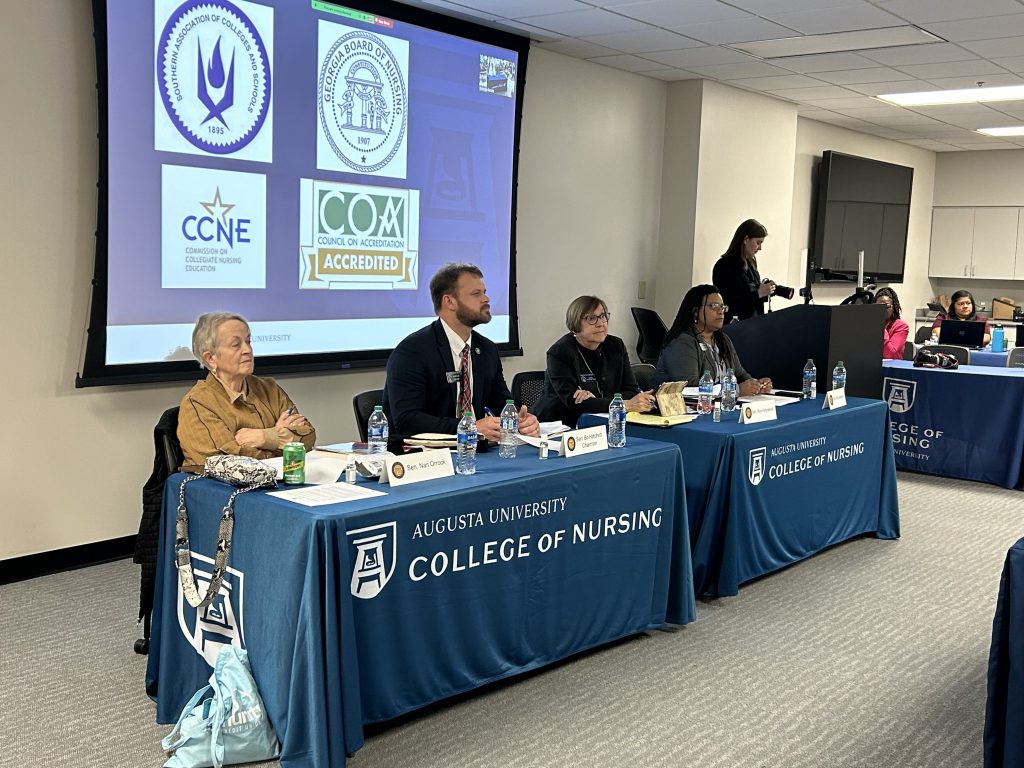
The primary topic of the hearing at Augusta University focused heavily on anesthesiologists and certified registered nurse anesthetists.
Prior to the hearing, the senators spent the morning with CRNA students in the J. Harold Harrison, M.D. Education Commons and Health Sciences Building, allowing the senators to observe the mock operating rooms where health professions students train. The senators also toured the dedicated lab spaces for the CRNA program and had opportunities to interact with current students.
“It was very eye-opening. The feedback I got from the senators that attended was they had no idea,” Broxton said. “And that’s exactly why the study committee was formed – to be able to say ‘this is how they’re trained; this is where the needs are; this is what it looks like in practice in these areas,’ in order for the study committee to come back and make a better informed decision about what is being asked of them.”
Finding a solution for the rural medical personnel shortage has been at the top of the list for both the College of Nursing and MCG for many years.
“I believe that AU has been actively preparing for this with the initiatives we have enacted,” NeSmith said. “For example, our Nursing Anesthesia Program requires rural rotations for our students, and our Family Nurse Practitioner and pre-licensure programs strongly support rural clinical experiences to introduce future nurses and advanced practice nurses to wonderful mutual benefits of practicing in rural communities. The effect of this is that 90% of our graduates stay in Georgia, with up to 30% choosing to work in rural communities.”
While MCG has made strides to alleviate the deficit, including introducing the 3+ Primary Care Pathway Program, Hess said more still needs to be done.
“While MCG has one of the largest class sizes in the nation, our state is still a net exporter of medical students. That’s because Georgia doesn’t have enough residency slots to train these new physicians in their chosen specialty after they graduate from medical school. And we know that physicians are likely to stay and practice where they train. Changing that is complicated because of federal laws that mandate the number of residency positions in each state. But, as the state’s public medical school, I view it as our obligation to help find a solution.”
The first hearing was held at Northeast Georgia Medical Center in Demorest, Georgia, at the beginning of September. The third hearing in Dodge County was cancelled.
The Senate study committee has until Dec. 15 to compile its recommendations to present to the Georgia Senate.
More information is available on the Senate Study Committee on Rural Medical Personnel Recruitment’s webpage, including full recordings of hearings.
 Augusta University
Augusta University
